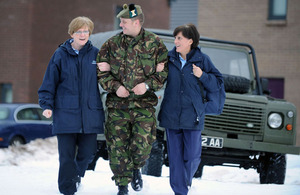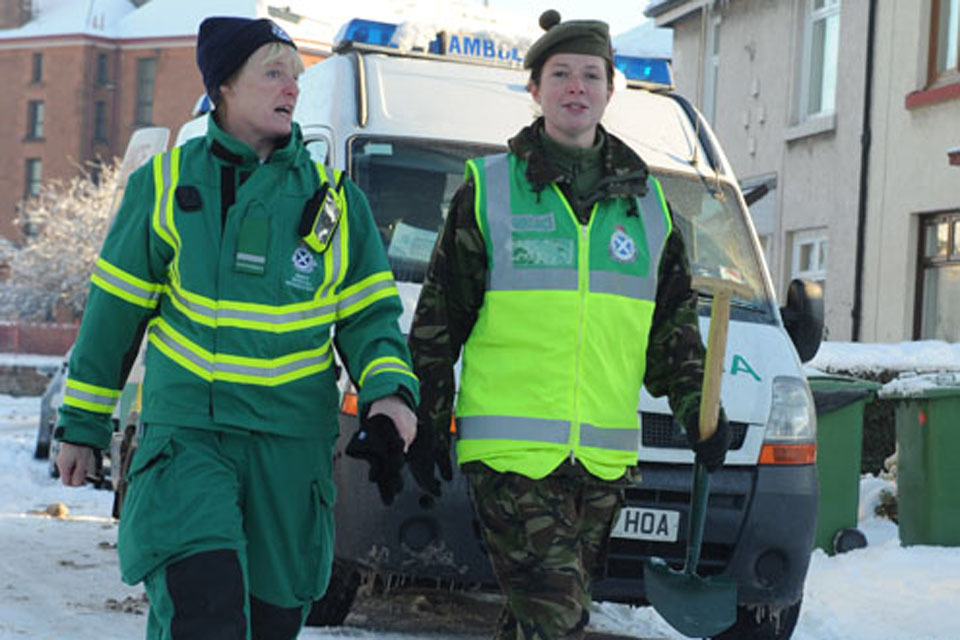Army assists Scottish communities during severe weather
Last week the Army in Scotland assisted local communities and organisations during the severe weather conditions.

Corporal Joe Mearns gives a helping hand to Community Staff Nurses Margaret McLoskey (right) and Rosemary Robertson [Picture: Mark Owens, Crown Copyright/MOD 2010]
In Lanarkshire troops supported the NHS (National Health Service) to get district nurses out to their patients using Army Land Rovers.
Army drivers from 6th Battalion The Royal Regiment of Scotland (6 SCOTS) and 32 Signal Regiment (Volunteers) used their 4x4 Land Rovers to transport NHS staff in and around Hamilton, Cumbernauld, Bellshill and Motherwell.
Speaking last week, Commanding Officer of 32 Signal Regiment (Volunteers), Lieutenant Colonel Philip Donegan, explained:
For this particular tasking we are providing vehicles and drivers to enable district nurses to visit outpatients and provide palliative care. Without this military support, many patients would be denied necessary medical care.
The support we are providing once again proves the adaptability and utility of the Territorial Army soldier. For some of these soldiers on task, driving is not their primary TA (Territorial Army) skill set.
In addition, some of these individuals have only recently returned from peacekeeping duties in Cyprus. They are effective, experienced and capable soldiers, adding value to the civil community.
Scotland’s top soldier, Brigadier George Lowder, Commander of 51 (Scottish) Brigade, was in charge of deploying military personnel onto the streets.
The Brigadier stressed that the military were not deployed to clear snow from the streets. He explained:

Christine Lyall, Special Operations Response Team paramedic team leader with the Scottish Ambulance Service, and Lance Corporal Mary Ramsay, Territorial Army [Picture: Mark Owens, Crown Copyright/MOD 2010]
“The troops have been deployed to save and preserve life, and alleviate significant distress.
By that I mean they have been clearing access routes to hospitals, surgeries, care homes and the like to make sure that vital supplies of fuel, medicines and food get to people that most need it.
We are also providing Army Land Rovers to ferry NHS staff to areas that are still snowed in so they can attend to their patients.
Colin Sloey, Executive Director of North Lanarkshire Community Health Partnership, said:
Although there have been significant improvements on all main roads there were still some areas which were hard to reach. Our dedicated clinical staff walked, often for miles, to ensure that our most vulnerable patients had access to health and care services.
To help ensure we got to see as many patients as possible we employed Army 4x4 vehicles to work with our community staff. The staff were delighted with the support of the Army during this challenging time.
At the start of the military response Headquarters 51 (Scottish) Brigade had over 200 soldiers from The Royal Regiment of Scotland and 32 Signal Regiment (Volunteers) to call on, as well as 25 Royal Navy and 40 RAF personnel who are currently based in Scotland.